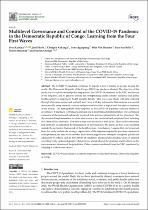Multilevel Governance and Control of the COVID-19 Pandemic in the Democratic Republic of Congo: Learning from the Four First Waves
Date
2023Author
Joel, Ekofo
Chrispin, Kabanga
Agyepong, Irene
Kashiya, Yves
Mukinda, Fidele
Metadata
Show full item recordAbstract
The COVID-19 pandemic continues to impose a heavy burden on people around the
world. The Democratic Republic of the Congo (DRC) has also been affected. The objective of this
study was to explore national policy responses to the COVID-19 pandemic in the DRC and drivers
of the response, and to generate lessons for strengthening health systems’ resilience and public
health capacity to respond to health security threats. This was a case study with data collected
through a literature review and in-depth interviews with key informants. Data analysis was carried
out manually using thematic content analysis translated into a logical and descriptive summary
of the results. The management of the response to the COVID-19 pandemic reflected multilevel
governance. It implied a centralized command and a decentralized implementation. The centralized
command at the national level mostly involved state actors organized into ad hoc structures. The
decentralized implementation involved state actors at the provincial and peripheral level including
two other ad hoc structures. Non-state actors were involved at both levels. These ad hoc structures
had problems coordinating the transmission of information to the public as they were operating
outside the normative framework of the health system. Conclusions: Lessons that can be learned
from this study include the strategic organisation of the response inspired by previous experiences
with epidemics; the need to decentralize decision-making power to anticipate or respond quickly and
adequately to a threat such as the COVID-19 pandemic; and measures decided, taken, or adapted
according to the epidemiological evolution (cases and deaths) of the epidemic and its effects on the
socio-economic situation of the population. Other countries can benefit from the DRC experience by
adapting it to their own context.

